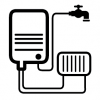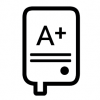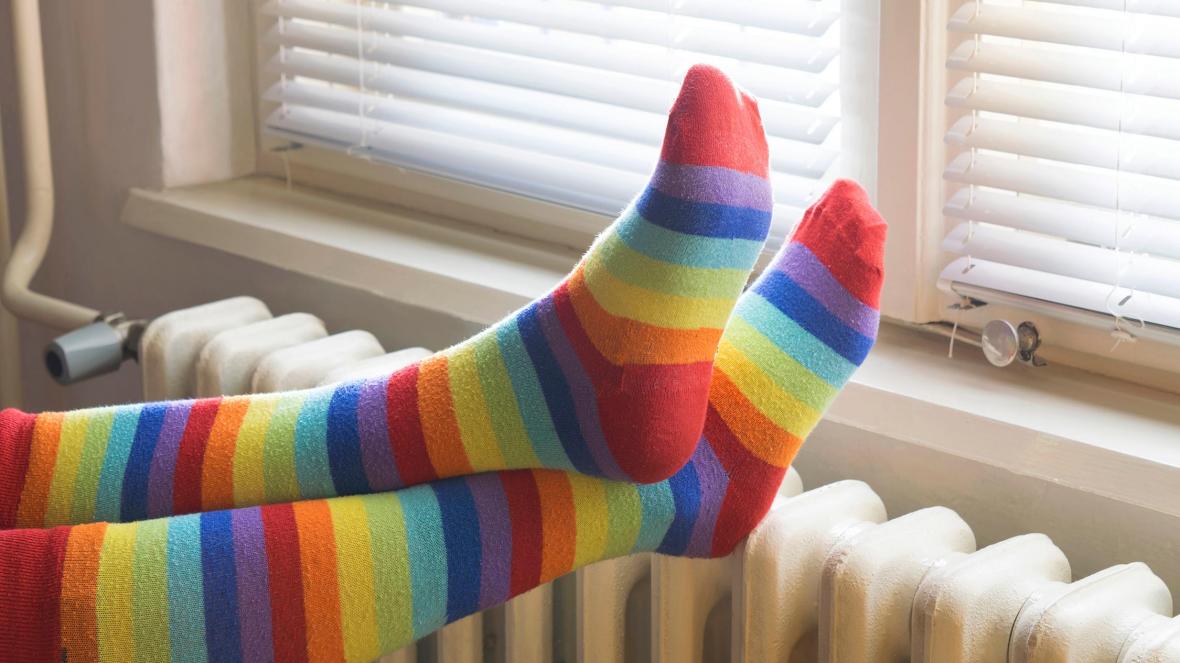
QUICK GUIDE SUMMARY
Boilers are a big topic! But we specialise in them. From gas combi boilers to electric heating systems, there are pros and cons to each. We bring you the ultimate guide to boilers, covering boiler types, fuel types, efficiencies, energy costs and boiler prices. The vast majority of UK households have a mains gas boiler and for the short-medium term it nearly always makes total sense to stick with that. For those off-grid homes or curious about alternative heating, there is a wide range of renewable and fossil fuel boiler options. For more specialist advice, try one of our sub categories of boiler below.
Genuine, unbiased consumer advice on all things Boilers
1) What is a boiler?
A boiler, sometimes called a water heater, supplies all of the heating and hot water for your home. It is usually wall hung, but sometimes floor standing, and in most cases has a ‘flue’ that goes through the wall to outside. Some boilers work with a hot water cylinder which is usually located on the first floor in the ‘airing cupboard’. Boilers run on different fuel types, including gas, oil, electric and biomass, but function in a very similar way. Most UK homes have a gas boiler. Those living in rural locations often have an oil boiler or may have switched to a renewable energy source such as a heat pump or wood-fuelled boiler.
2) Fuel types
The UK has a wide range of heat sources for homes that includes gas, electric, oil, biomass, solid fuel (coal) and heat pumps. The vast majority of UK households have a main gas boiler. Around 4 million households are off-grid of which around 1.1 million are oil boilers and the rest made up of electric, LPG and renewable heat sources.
Gas
![]()
The vast majority of homes in the UK - around 22.5 million – work on ‘mains gas’. This means the gas is delivered to your home via a large underground network of pipes. Gas is known as a fossil fuel, along with oil, and is one of the cheapest forms of heating fuel –around 3p per kWh. Most of the UK’s gas is now imported. For more on gas boilers, installation, cost and maintenance see our Gas Boiler Section.
Oil
![]()
Around 1.1 million homes use oil to heat their homes. Oil is store on site in a large tank and delivered via fuel lorries. Oil is a very reliable fuel but costs at least twice as much as mains gas, around 5.7p per kWh. For more on oil boilers, installation, cost and maintenance see our Oil Boiler section.
Electric
![]()
Electric heating is one of the simplest and cheapest to install as the boilers are very simple and do not require fuel storage. However electricity is the most expensive fuel at around four times the cost of mains gas at around 12.5p per kWh.
LPG
![]()
LPG stands for Liquid Petroleum Gas, which is essentially the same as mains gas but comes in fuel canisters (bottles). LPG is a little more expensive than oil at around 6.9p per kWh.
Solid fuel
![]()
A very small percentage of the population still uses a form of solid fuel for heating. Known more commonly as anthracite (formerly coal) it is reasonably cheap to by – around 4p per kWh – but the boilers tend to be less efficient so comparable fuel bills will be higher.
Biomass boilers
![]()
A form of solid fuel, biomass can be wood pellets, chips, logs or briquettes (compacted wood). Prices for pellets are around 5p per kWh and lower for chips and logs, but the maintenance costs are significantly higher for all three.
Air, water and ground sources
![]()
Heat pumps take latent heat in the air, water or ground and raise the temperature high enough to run underfloor heating networks. All heat pumps use electricity to work, which is the most expensive fuel source, but as they extract from the air, water or ground is which ‘free’, running costs are comparable with oil/LPG. Find out more in our Renewables section.
3) Boilers by type
Across all fuel types there are three common types of boiler – combi (combination), system and heat-only (also called ‘regular’ and ‘conventional’). All boilers, including heat pumps and biomass, are either only available in a heat only model or this is an option.

Combi boilers
Combi boilers are a single unit that provide all of the heating and hot water for the home. Hot water is produced within the boiler using a ‘heat exchanger’. Some ‘combi’ boilers include the hot water tank in a larger unit. Combi boilers are available for gas, oil and electric fuels. For more on gas combi boilers, read our Combi boiler guide

Heat only boilers
Heat only boilers also work with a hot water cylinder. All boilers, including heat pumps and biomass, are heat only. Heat only boilers can be either ‘vented’ or ‘sealed’. Vented is the more old fashioned way of setting up a heating system but is still valid. (NB many such tanks are disconnected, but remain in the loft!). Most modern boilers work on sealed systems with no tanks.

System boilers
System boilers work with a hot water cylinder, usually an unvented cylinder, and are most commonly found in new build properties. Certain boiler components are integral to the boiler (pump and diverter valve) which is how they differ from heat only boilers.

Condensing boilers
All new gas boilers, and nearly all gas boilers manufactured since 2005, are condensing boilers. Many oil boilers are also condensing. The term condensing refers to the progress of recovering heat that was previously lost through the flue. Non condensing boilers can be as little as 60% efficient as 40% of the heat generated by the boiler was lost via the flue to outside. Condensing boilers can be upto 94% efficient provided they are set up property.

Back boilers
Back boilers are a form of heat only boiler and work with a hot water cylinder. Back boilers are located in the fire place and have a gas fire on the front. Whilst many back boilers can still be repaired, they cannot be replaced as they do not ‘condense’.

Warm air units
Warm air units were popular in the 1970s and are still manufactured. They run on gas but instead of supplying radiators they blow warm air around the property via a network of floor vents.
4) Heat outputs
The average UK home needs no more than 6kW of heat on a very cold day. A 6-10kW boiler will comfortably heat the vast majority of UK homes. This is important to remember Hot water production is a factor for sizing a boiler that works with a hot water cylinder, so you may need a larger boiler depending on your set up.
5) Boiler efficiencies
Efficiency for boilers is expressed both as a percentage and as an ErP rating, although both can be very misleading if taken in isolation. The percentage figures refers to how much of the energy needed by the boiler is used to heat the home. The ErP rating (between A+++ - G) takes into account the cost of the fuel and its ‘carbon intensity’, i.e. the carbon emissions from the fuel during production and use.
Electric boiler efficiency
Electric boilers for example are nearly 100% efficient. This simply means that all of the energy generated by the boiler is used for heating. Whilst an electric boiler is clearly very efficient, it is the most expensive type of boiler to run. This is due to the high cost of electricity and also its carbon intensity, i.e. how much energy is lost during the process of creating electricity. For this reason electric boilers are ErP rated D.
Running costs can be kept down if the heating runs on Economy 7, which is a reduced electricity tariff available for 7 hours of the night (often 11pm – 6am). This can be achieved with the use of a thermal store, which is a type of hot water cylinder that also produces heating water. The thermal store can be charged during the night ready for use during the day.
Gas and oil boiler efficiency
Condensing gas and oil boilers on the other hand have the capacity to be 92-94% efficient, which means a small percentage of the heat they generate is wasted (via the flue).
Condensing gas and oil boilers are A rated because whilst they waste some of the heat they generate, the cost of gas is low and it requires little processing to convert it into useable fuel. However achieving efficiencies of over 90% depends entirely on how well the rest of the system is designed and controlled. Actual average efficiencies in the home are nearer to 80%. Getting the central heating system design right is just as important as which boiler you pick.
Heat pumps
Heat pumps however, which also run on electricity, are A rated because for every one unit of electricity they utilise, they can extract around three units of free energy from the air, water or the ground. This makes them over 250% efficient (see table below).
Biomass and solid fuel efficiencies
Biomass boilers tend to be amongst the most efficient heat sources as the fuel is renewable and very little heat is wasted in the process of heating the home, but they are very expensive to fit and take up a lot of space.
Solid fuel boilers (that burn anthracite or coal) on the other hand are G rated! Not only are they one of the most inefficient forms of heating, the cost of fuel is high because boiler efficiencies are low, as is the carbon cost of use.
6) Fuel costs and fuel bills
Fuels bills will be based on 1) the cost of fuel per kW hour and 2) the efficiency of your heating system. The costs shown in the table below show approximate fuel costs per kWh to heat your home AFTER boiler efficiency. If efficiencies for gas and oil boilers are lower in the home than on the label, then the cost of fuel per kWh will be higher.
Efficiencies for air and ground source are higher because they use a large proportion of ‘free’ energy from the air or ground. Air to water and ground source heat pumps are also eligible for Renewable Heating Incentive (RHI) payments which helps with the much higher cost of installation (see Prices section below).
| Fuel | Mains gas | Oil | LPG | Electricity | Economy 7 | Air source | Ground source | Wood pellets | Solid fuel |
|---|---|---|---|---|---|---|---|---|---|
| Cost per kWh after boiler efficiency | 4.1p | 5.7p | 6.9p | 14.5p | 9p | 7.8p | 5.9p | 6.3p | 8.5p |
| Efficiency assumption | 90% | 90% | 90% | 100% | 100% | 270% |
350% |
90% | 75% |
7) Boiler installations
Each fuel type has a different set of installation requirements and for this reason it is unlikely that one installer will fit more than two heat sources and the vast majority will stick to one. Gas boiler installers will often fit oil boilers, particularly if they are in a rural area.
Some gas boiler installers have diversified into heat pumps or biomass boilers. Many oil boiler fitters have up skilled into these technologies as a natural replacement for their off grid customers. In all instances system design is the most important factor for longevity and efficiency. Irrespective of heat source, the correct system set up is vital but rarely given due consideration.
Mains gas installations
For the 22.5 million of you on mains gas, a gas boiler installer is all you’ll ever need and there are a thousands of installers. From sole traders to national companies, there are pros and cons to who you use.
Off-grid installations
For off-grid properties and new builds, it is best to get quotes from installers that specialise in each of the technologies. Remember that your heat requirement is likely to be lower than you think and a heat loss survey is an absolute must in order to get an accurate heating specification.
8) Suitability
If you are on mains gas, a replacement gas boiler will always be the most cost-effective option. Mains gas is still one of the cheapest fuels and boiler replacement costs remain at the lower end. Many householders on mains gas would like to consider renewable options options. The most suitable options for average UK houses are:
- Solar thermal panels - these panels go on the tool and supply hot water. They can also supply heating if set up with a 'thermal store' cylinder. Solar thermal is one of the most efficient forms of renewable heat but cannot provide all the heating and hot water need for the home all year around.
- Solar PV panels - these provide electricity to your home. In the early years surplus electricity went back to the grid. Now battery storage is far more commonplace so that energy generated during the day can be used in the evenings when occupants are home.
- Air source heat pumps - often regarded as the reserve of new build homes, air source heat pumps in fact can heat older properties even when they have not been retrofitted with better insulation. As the average UK home only requires 6-10kW of heat, and heat pumps are available in 6-14kW as standard, so they are in fact capable. The main consideration is the size of the radiators as temperatures will be lower by the heating will run for longer.
For off-grid properties, particularly larger properties with an outbuilding or garage to spare, ground source and biomass heating are options. These are more expensive but the RHI is available for another year or so.
9) Prices
The table below gives approximate boiler costs for common types of heating system. The costs are for the heating unit only and do not including installation costs or a hot water cylinder where required. In all cases prices are shown in a range as they will vary according to brand and size.
| Boiler | Heat only | System | Combi |
|---|---|---|---|
| Gas/LPG | £480-£1,600 | £580-£1,600 | £600-£2,000 |
| Oil | £1,200 - £2,500 | £1,450-£2,600 | £600-£2,000 |
| Electric | £500-£850 | - | £1,000-£1,900 |
| Air source heat pump | £3,000-£6,00 | - | - |
| Ground source heat pump | £13,000 - £20,000 | - | - |
| Biomass | £7,000 - £15,000 | - | - |
| Coal/solid fuel | £2,000 | - | - |
10 ) Heating controls
Heating controls are in many ways an even bigger topic than boilers. There are many varieties of thermostat - smart, advanced, modulating, weather compensation, dial, wireless, wifi - and new boilers must meet minimum standards for building control purposes. We explore all the different types of heating control, compatibility, efficiency and compliance in our consumer guide to Heating Controls.
